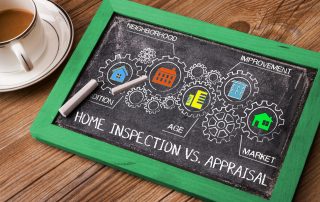The home-buying and selling processes can be confusing and intimidating, and any visit from an expert can give homeowners the impression of being scrutinized. Moreover, many people think home appraisals and inspections are essentially the same thing, when in reality they’re two very different assessments.
The commonality between appraisals and inspections is that they’re both helpful in the multi-step, home-buying process, to ensure that the house’s value and condition is fully understood.
The Appraisal Process
In order to determine the property’s market value, your home must be appraised for improvements or deficiencies that might affect the overall value. The appraisal is influenced by a multitude of factors, including the property location, square footage, and pricing of similarly sized and located homes.
This process is more of a general walk-through, with a certified, state-licensed home appraiser taking note of observable elements. In contrast, a home inspection is more detail-orientated in that the inspector conducts tests for efficiency (but more on that later).
The home appraiser takes measurements of functioning and any obvious damage to the exterior, interior, and extra features of the home according to minimum condition standards and takes note of any upgrades that could improve the potential value of the property. After researching and analyzing comparable homes, the appraiser will draft an expert report detailing the market value.
At the end of the day, the appraiser is most concerned with determining the value of the home and protecting the lender. The appraisal report directs the lending organization on whether or not to approve the borrower for financing. While the lender orders the appraisal, the perspective home buyer ends up paying for the associated fees in closing costs or upfront but is then removed from the final closing costs bottom line.
What to Expect When They’re Inspecting
A home inspection is an examination of the property’s condition and focuses on current and potential problems rather than the overall value. A home inspector’s visit is more thorough than an appraiser’s and could actually take several hours depending on the property. Mechanical systems such as electric, plumbing, heating and cooling, as well as appliance functionality are rigorously assessed by a properly certified and licensed inspector in order to give feedback on repair and safety concerns.
Home inspectors are hired to protect the buyer, whereas the appraiser is there to serve the lender. Expect to pay a few hundred dollars for an inspection from a reputable company. The inspector will complete a detailed report, diagnosing areas that need attention and identifying any problems that might affect the decision to purchase the property.
As a buyer, be aware that an inspector might not catch every little hole in the wall. Although it’s not required, you should plan on being present at your home inspection in order to clear up any misconceptions and/or answer any possible inquiries about the findings of the examination. Depending on the condition of the prospective home, you can use the inspection to decide whether to negotiate a different price with the seller or walk away from the house all together.
Newly built homes are still good candidates for inspection and can have just as many potential problems as older constructions. For this reason, new construction homes should be checked for structured foundation, proper insulation, and normal interior and exterior examination. A blower door test is a common test in new construction to determine the home’s air tightness and future energy consumption levels.
Effects and Considerations
Appraisals are almost always required by lenders, while inspections typically are conducted at the buyer’s request. Skipping a home inspection and its associated costs might encourage the seller to push the sale along faster and sell for a better price, however, you could be losing more money in repairs down the line.
While it is optional, a home inspection is an important step in the home-buying and selling process and should be considered to ensure the highest protection on your investment. Moreover, a home inspection can be a useful negotiating tool as an opportunity to ask for repairs or a price reduction.
A successful appraisal and inspection can give homebuyers the assurance of making a sound purchase—or the knowledge to walk away from a home that isn’t worth the investment. Performing both an appraisal and inspection on your home can provide you with the confidence and knowledge to make the right decision.
Performing both an appraisal and inspection on your home can provide you with the confidence and knowledge to make the right decision.
